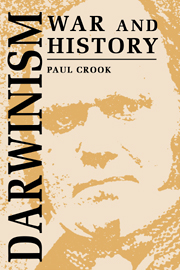 Darwinism, War and History
Darwinism, War and History Book contents
- Frontmatter
- Contents
- Acknowledgements
- Introduction
- 1 The Darwinian legacy
- 2 The age of Spencer and Huxley
- 3 Crisis in the west: the pre-war generation and the new biology
- 4 ‘The natural decline of warfare’: anti-war evolutionism prior to 1914
- 5 The First World War: man the fighting animal
- 6 The survival of peace biology
- 7 Naturalistic fallacies and noble ends
- 8 Conclusion
- Appendix: Social Darwinism
- Notes
- Bibliography
- Index
7 - Naturalistic fallacies and noble ends
Published online by Cambridge University Press: 31 August 2009
- Frontmatter
- Contents
- Acknowledgements
- Introduction
- 1 The Darwinian legacy
- 2 The age of Spencer and Huxley
- 3 Crisis in the west: the pre-war generation and the new biology
- 4 ‘The natural decline of warfare’: anti-war evolutionism prior to 1914
- 5 The First World War: man the fighting animal
- 6 The survival of peace biology
- 7 Naturalistic fallacies and noble ends
- 8 Conclusion
- Appendix: Social Darwinism
- Notes
- Bibliography
- Index
Summary
Science and ethics
The war years elicited criticism of conflict-style Social Darwinism on grounds that it illicitly universalised data from the field of biological science, that it merged science and values, and tended to ‘reduce’ humankind to non-autonomous biological units. It is quite revealing that such methodological criticism was almost entirely directed at militaristic or aggressively capitalistic doctrines, rather than at the evolutionary models, or latent determinism, of peace biology. The privileged status of the latter model in this regard seems a telling sign of its entrenched intellectual position and respectability. Peace biologists were able to have their cake and eat it too. They commended cooperative models of animal behaviour as good examples for humans. At the same time they benefited from the epistemological difficulties of the enemy school when it used animal comparisons to legitimise war and human pugnacity. It has not been sufficiently noticed how peace biology ‘cashed in’ on major compatibilities between its value system and that of traditional mores, ethical and cultural. By contrast militarism – at least in the Anglo-American world – suffered by its association with unconventional standards, and found itself subject to more stringent analysis of its methods and philosophy.
- Type
- Chapter
- Information
- Darwinism, War and HistoryThe Debate over the Biology of War from the 'Origin of Species' to the First World War, pp. 176 - 191Publisher: Cambridge University PressPrint publication year: 1994


